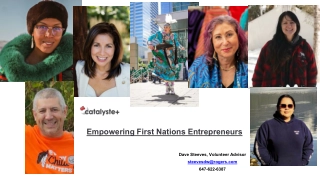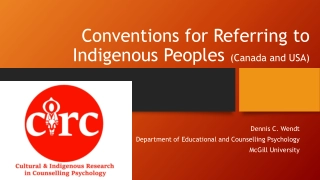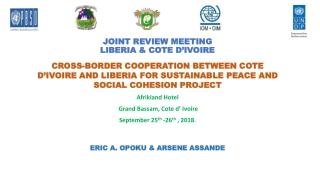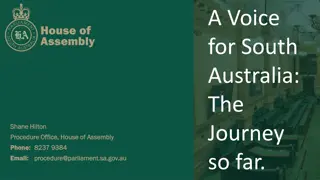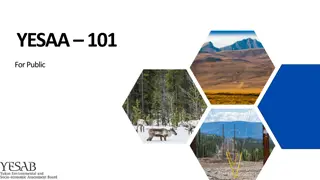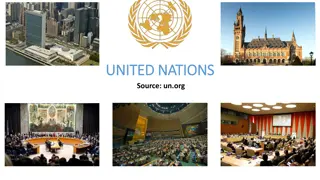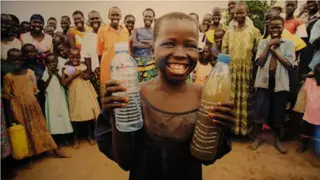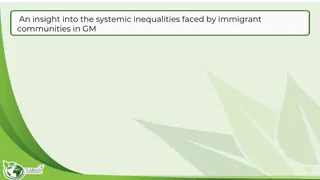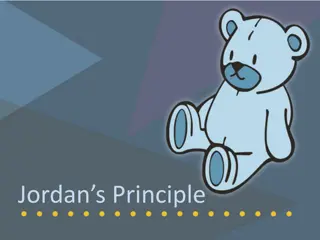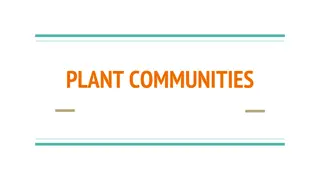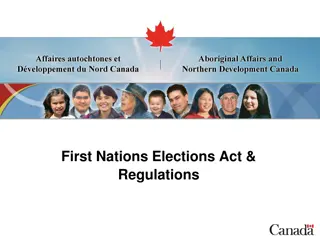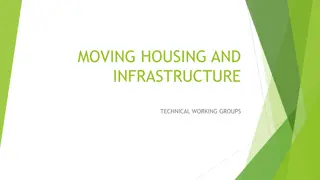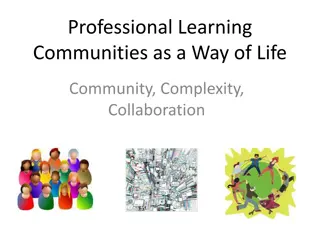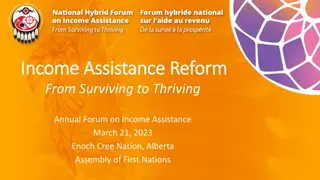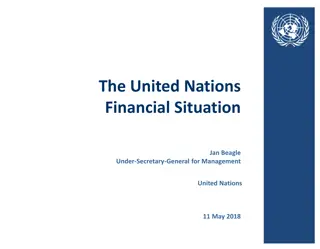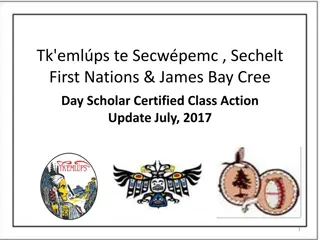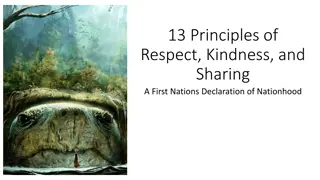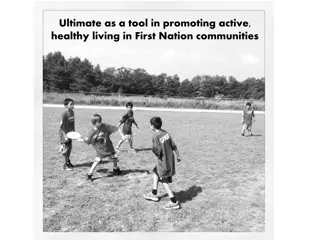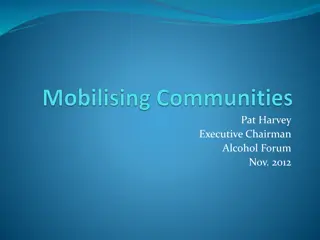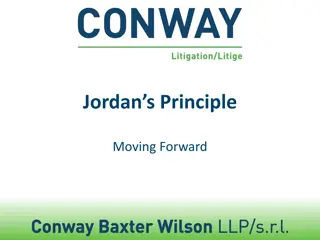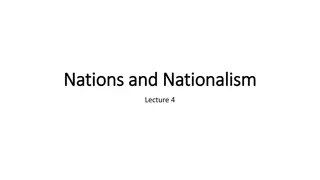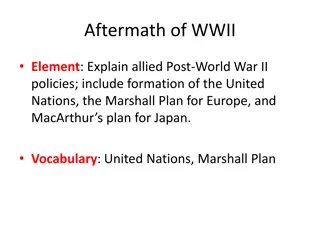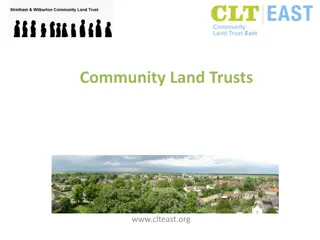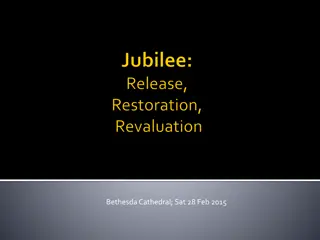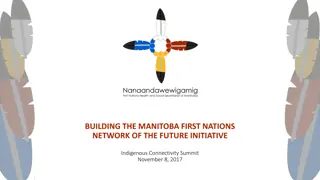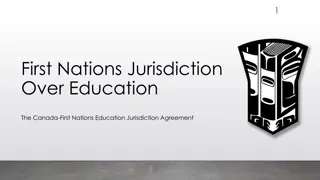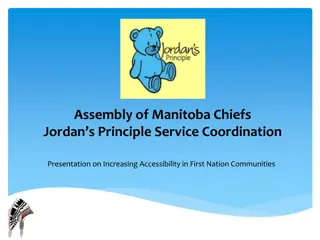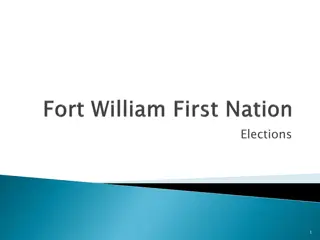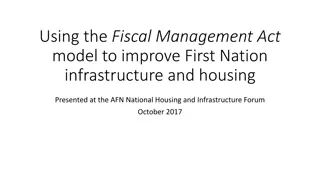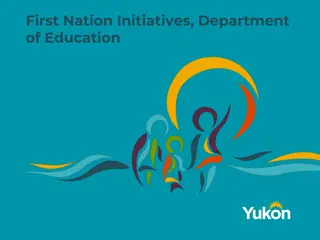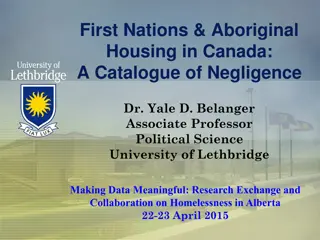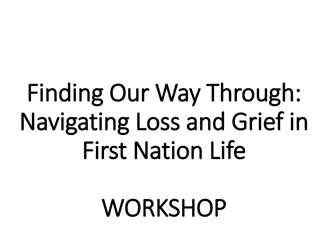Empowering First Nations Entrepreneurs
Empowering First Nations Entrepreneurs is a program by OFNEDA, a Canadian economic development organization, providing guidance and support to Indigenous entrepreneurs. The initiative matches Indigenous partners with experienced volunteer advisors to enhance capacity-building and facilitate communit
0 views • 28 slides
Conventions for Referring to Indigenous Peoples in Canada and the USA
This article outlines guidelines for referring to Indigenous Peoples, emphasizing specificity and respect for preferred names and terms. It discusses the importance of capitalizing terms related to Indigenous Nations and cautions against using terms implying colonial possession. The use of terms lik
1 views • 24 slides
Cross-Border Cooperation Project for Sustainable Peace and Social Cohesion
Context: Addressing tensions along the Liberia and Côte d'Ivoire border post-civil crisis and war, a joint review meeting was conducted to enhance cooperation, trust, and security between the border communities. The project, supported by the United Nations and the Peace Building Fund, aimed to prom
0 views • 30 slides
Empowering Indigenous Voices in South Australia
Explore the journey of South Australia in recognizing and empowering Indigenous voices through various initiatives like the Aboriginal Representative Body Bill and the First Nations Voice Act. Witness the historical agreements and committees established to uphold the rights and representation of Fir
4 views • 13 slides
Regional Education Agreement Costing Tools Presentation
Presented by Bram Lerat, Khrystyna Orobets, and Ronda Ziakris for the Assembly of First Nations, this presentation discusses tools available for First Nations education costing studies, including inclusive education and transportation cost models. The session covers key elements of cost studies and
1 views • 26 slides
Indigenous Services Canada: Emergency Management in First Nations Communities
Indigenous Services Canada plays a vital role in emergency management for First Nations communities through various programs and initiatives. These programs focus on strengthening resiliency, preparedness, response, and recovery in the face of hazards and emergencies. The department collaborates wit
2 views • 18 slides
Understanding the Purpose and Origin of YESAA Legislation
YESAA, the Yukon Environmental and Socio-economic Assessment Act, was developed in collaboration with Yukon First Nations to ensure environmentally and socially responsible project assessments. The Act, passed in 2003, aims to protect environmental quality, heritage resources, and the well-being of
3 views • 19 slides
Understanding Communities: Characteristics, Interactions, and Differences from Society
Communities are groups of people with shared characteristics and goals, fostering a sense of belonging and mutual support. They thrive on social interactions, diversity, and interdependence. Contrasted with society, where diverse communities coexist, communities have a more concrete existence and lo
6 views • 6 slides
Overview of the United Nations: Mission, Membership, and Impact
The United Nations, established in 1945 with headquarters in New York City, is an international organization comprising 193 Member States. Guided by its founding Charter, the UN addresses various global challenges such as peace, climate change, human rights, and more. Through its bodies and committe
0 views • 21 slides
Water Scarcity: A Global Crisis Impacting Communities Worldwide
Water scarcity is a pressing issue affecting both developing and developed nations, leading to devastating consequences such as limited access to clean water, health risks from lead contamination, and environmental degradation. The root causes include climate change, pollution, and population growth
1 views • 14 slides
Systemic Inequalities Faced by Immigrant Communities in Greater Manchester
Gain insight into the systemic inequalities faced by immigrant communities in Greater Manchester, including definitions of refugees and asylum seekers, a snapshot of refugee and migrant communities in Manchester, the Iranian diaspora in the UK, global migrant statistics, and common health issues fac
0 views • 10 slides
Understanding the League of Nations: Good Idea or Not?
The League of Nations, established after WWI, aimed to promote peace through collective security and cooperation among nations. It faced challenges due to limited powers and the attitudes of key member countries. Despite its intentions, the League ultimately struggled to prevent future conflicts.
0 views • 9 slides
First Nations Attack on Fort Michilimackinac 1763: Causes, Tribes, and Aftermath
The First Nations' attack on Fort Michilimackinac in 1763 was triggered by British actions that disrupted their way of life. The Ojibwe, Odawa, Potawatomi, Ottawas, and Hurons were involved in the attack, led by Chief Pontiac. Following the attack, the British did not rebuild the fort but establishe
1 views • 7 slides
Understanding Jordan's Principle and Its Impact on First Nations and Inuit Children in Canada
Jordan's Principle was named in memory of Jordan River Anderson, a young boy whose tragic story led to the establishment of a legal requirement ensuring access to services for First Nations and Inuit children in Canada without delays or disruptions. This principle aims to prevent situations where ch
0 views • 9 slides
Understanding Plant Communities: Definition, Characteristics, and Succession
Plant communities are naturally occurring groups of plant and animal populations living in a common environment. They consist of various qualitative and quantitative characteristics such as floristic composition, vitality, density, cover, abundance, frequency, and more. Ecotones and edge effects pla
2 views • 8 slides
Enhancing First Nations Governance through the First Nations Elections Act
The First Nations Elections Act (FNEA), developed between 2008 and 2011, addresses weaknesses in the Indian Act election system by offering an optional framework for First Nations governance. Key components include four-year terms, common election days, court appeals, defined offenses, and opting ou
0 views • 14 slides
Technical Working Groups in Indigenous Housing and Infrastructure Development
National and regional technical working groups play vital roles in advancing housing and infrastructure development among Indigenous communities in Canada. Examples include the Ontario First Nations Technical Services Corporation (OFNTSC) and the First Nations Technical Services Advisory Group Inc.
1 views • 19 slides
Understanding Orange Shirt Day & First Nations Heritage
Lend your support to Orange Shirt Day as a tribute to First Nations children who suffered in residential schools. Learn about the resilient spirit of First Nations families and their rich cultural traditions.
0 views • 13 slides
Understanding Professional Learning Communities in Education
Professional Learning Communities (PLCs) are essential in education for fostering collaboration, sharing knowledge, and improving teaching practices. This article explores the benefits of PLCs, types of communities, research on learning communities, and the formation of teacher professional communit
0 views • 14 slides
Reforming Income Assistance for First Nations: Building Towards Self-Determination
Income Assistance Reform for First Nations aims to address the longstanding gaps in the current program, focusing on enhancing self-determination and support for thriving communities. The initiative involves a co-development process led by First Nations to make the program more responsive to their u
0 views • 9 slides
United Nations Financial Situation Analysis
This analysis provides insights into the financial status of the United Nations as of various dates in 2016, 2017, and 2018. It includes data on assessments, payments, outstanding dues, cash on hand, and the number of member states paying in full. Charts visualize the regular budget assessment statu
0 views • 24 slides
Update on Tk'emlps te Secwepemc, Sechelt First Nations & James Bay Cree Day Scholar Certified Class Action
This update provides information on the ongoing negotiations and discussions between Tk'emlps te Secwepemc, Sechelt First Nations, James Bay Cree, and the Canadian government regarding the Day Scholar Certified Class Action. Minister Bennett appointed a Ministerial Special Representative to facilita
0 views • 9 slides
Principles of Respect, Kindness, and Sharing: A First Nations Declaration
In this declaration, the author emphasizes the responsibility of First Nations as caretakers of their ancestral lands. It discusses the historical exclusion of First Peoples in the formation of Canada and calls for the recognition and preservation of Indigenous rights and sovereignty. The text highl
0 views • 16 slides
Ultimate as a Tool for Promoting Active, Healthy Living in First Nation Communities
Context: The use of Ultimate as a tool in promoting active, healthy living in First Nation communities is highlighted. Emphasis is placed on the benefits such as being inexpensive, fun, and promoting physical activity and chronic disease prevention. Like-minded principles and observations from engag
0 views • 14 slides
Mobilising Communities for Positive Impact: A Call to Action
Explore the journey of Pat Harvey and The Prompt in spearheading initiatives to mobilize communities for positive change. From tackling issues related to alcohol to fostering alignment and synergy across agencies and communities, the focus is on research, fine-tuning strategies, and implementing evi
0 views • 8 slides
Jordan's Principle: Advocating for First Nations Children's Rights
Jordan's Principle is a vital advocacy tool aimed at ensuring equitable access to necessary services for First Nations children, emphasizing prompt resolution of jurisdictional disputes. Originating from the story of Jordan River Anderson, its implementation has faced challenges and legal battles. C
0 views • 21 slides
Understanding Nations, Nationalism, and Their Emergence: A Comprehensive Overview
Explore the concept of nationhood, the evolution of nationalism, and the intricate relationship between cultural and political identities. Delve into the emergence of nations, the definition of a nation, and the complexities of cultural nations. Uncover historical examples, such as the Polish-Lithua
0 views • 15 slides
Post-World War II Policies: United Nations, Marshall Plan, and MacArthur's Plan
Following the aftermath of World War II, allied nations implemented various policies such as the formation of the United Nations, the Marshall Plan for Europe, and MacArthur's plan for Japan. Post-war Europe faced severe devastation, leading to the need for international peacekeeping efforts and eco
0 views • 38 slides
Community Land Trusts: Empowering Communities through Collective Ownership
Community Land Trusts (CLTs) are legal entities run by local volunteers to collectively own and manage property/land, undertake development projects, and secure assets for the community. With priorities set by communities to address local issues like affordable housing and recreation, CLTs provide a
0 views • 13 slides
The Divine Narrative: Nations, Jubilee, and History - Reflections on God’s Sovereignty
Explore the intertwining threads of biblical prophecies, the significance of Jubilee cycles in Israel, and historical milestones, all illustrating God's divine plan for nations. From the ancient testimonies of Israel to modern-day reflections of Jubilee observances, witness the grand tapestry of God
0 views • 15 slides
Connecting Manitoba First Nations: Building a Path to Digital Future
The Manitoba First Nations Network of the Future Initiative aims to bridge connectivity gaps by providing fiber optic and wireless access to schools, healthcare facilities, band offices, and residences. Through tiered designs, thousands of residents and households will gain internet connectivity, fo
0 views • 19 slides
Disability Employment Reform Presentation by Kellie Spence - Better Together Connecting for First Nations Employment
Group Manager Kellie Spence presents on the Disability Employment Reform, focusing on improving employment outcomes for First Nations peoples with disabilities. The presentation covers key topics such as program changes, market strategy, and current statistics, highlighting the need for a new specia
0 views • 16 slides
Understanding First Nations Education Governance Agreements
Explore the Canada-First Nations Education Jurisdiction Agreement and its significance, including the framework, funding, and key agreements with British Columbia. Learn about the self-government rights of Indigenous peoples and the importance of sectoral agreements in education governance.
0 views • 37 slides
Increasing Accessibility in First Nation Communities: Jordan's Principle Service Coordination
The Assembly of Manitoba Chiefs led an initiative to address discrimination against First Nations children and fully implement Jordan's Principle. The Keewaywin Engagement focused on creating a regional response to ensure access to essential services. The final report outlined recommendations for en
0 views • 20 slides
Understanding First Nations Elections in Canada
First Nations governments in Canada are formed by chiefs and councillors who make decisions on behalf of their communities. Elections can be held in different ways, such as under the Indian Act, through community leadership selection processes, or pursuant to self-government agreements. The process
0 views • 13 slides
Improving First Nation Infrastructure and Housing through Fiscal Management Act Model
The presentation at the AFN National Housing and Infrastructure Forum in October 2017 highlighted the challenges faced by First Nation communities in developing sustainable infrastructure. The current system is inefficient, prompting the exploration of alternatives like the First Nations Fiscal Mana
1 views • 9 slides
Addressing First Nation Initiatives in Yukon: Education & Cultural Preservation
Explore the significant role of the ADM position in First Nation Initiatives, historical context, and cultural efforts in Yukon. Learn about the initiatives to improve education outcomes, integrate First Nations context in the system, and preserve cultural identity. Understand the challenges faced b
1 views • 17 slides
Challenges in First Nations & Aboriginal Housing Research
The slides touch upon negligence and biases in data collection related to First Nations and Aboriginal housing in Canada. They explore trends in urban Aboriginal homelessness, bureaucratic neglect, and different approaches to Indian-state relations. The content also delves into historical studies on
0 views • 19 slides
Collective Security in International Relations: A Comprehensive Overview
Collective security is a crucial concept in international politics, aimed at maintaining peace and preventing aggression among nations. This system calls for joint action to counter threats to global peace, originating post-World War I with the League of Nations. Based on four key principles, nation
0 views • 8 slides
Navigating Loss and Grief in First Nation Life Workshop
This workshop provides a culturally relevant and supportive environment for health care providers and others offering family support to explore loss, grief, and bereavement in First Nation communities. Participants will enhance their awareness, knowledge, and skills in reflective practice to process
0 views • 48 slides
